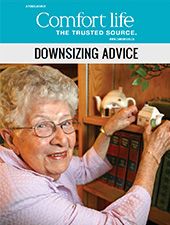What to know about this topic:
- Cancer prevention and early detection
- Prevalent types of cancer in the elderly
- For seniors with cancer
- Sources to Learn More About Cancer and the Elderly
Cancer prevention and early detection
As with the general population, early diagnosis of cancer in seniors means a greater chance that treatment will be effective. The older the patient is, the greater the likelihood that they will be weaker – either from age or the growing cancer. This is another reason to be acutely aware of one's health and to receive regular medical checkups.
Women should do regular breast exams no matter their age and both sexes need to be aware of internal discomfort of any kind. Similarly, men should be regularly tested for prostate cancer. There is a mountain of data proving that regular mammograms, pap tests, colonoscopies, and other tests are very effective in catching cancer early.
The following lists possible indications or symptoms of cancer in seniors. Please note that these are possible signs of concern, even though these may not indicate the presence of cancer.
Some potential signs of cancer in the elderly:
- thickening or lumps under the skin in the breast or any other body part
- mole growth or change in appearance
- a sore that refuses to heal
- lingering cough, cold, or hoarseness
- difficulty swallowing
- unusual discharge or bleeding
- unusual fatigue or abnormal tiredness
These symptoms can just as often be non-cancerous or they may be caused by any of numerous other issues. However, if you or an elderly loved one experiences any of these symptoms you should visit a doctor.
It is critical to the treatment of cancer that it be detected early. Caregivers, family members, and seniors themselves need to be vigilant against any signs of cancer. Healthy daily living, exercise, and diet, as well as social and spiritual care, are critical to the prevention of cancer as well as recovery.
Prevalent types of cancer in the elderly
The Canadian Cancer Society reports these prevalent trends in seniors' cancer:
Breast cancer occurs primarily in women aged 50 to 69. In addition, 28% of breast cancer cases are diagnosed in those women who are over 69. The mortality rate in women 80 years and older is much higher than that of any other age group.
Prostate cancer is diagnosed most frequently in men aged 60 to 69 years. Similar to the figures given for women with breast cancer, most prostate cancer deaths occur in men over 80.
The only form of cancer that does not peak in mortality after the age of 80 is lung cancer, where the highest mortality rate occurs between the ages of 70 and 79. 2
Cancer is considered primarily an environmental or lifestyle disease although heredity can also play a role so seniors worried about cancer should be reminded that it's never too late to make changes to reduce risks.
For seniors with cancer
If you are or know a senior with cancer there are several online resources you need to be aware of:
The Canadian Cancer Society offers a wide variety of resources including advice and counsel on living with cancer, advice for caregivers, and stories of hope.
Cancer Connections was an online project of Photosensitive in which photographers both amateur and professional (including many elderly cancer survivors) shared images and stories from their fight with cancer.
Our /blog has more about cancer risks and prevention for seniors, with regular advice from experts and others dealing with cancer.
The Intercultural Cancer Council proposes the creation of groups online and offline, including groups for seniors with cancer. They also have a newsletter and other resources. Learn more.
Sources to Learn More About Cancer and the Elderly
1. Stats Canada
2. Canadian Cancer Society



